 A for-profit company that believes it can earn billions from web users who illegally download music, movies and television shows wants the power to lock your web browser until you provide a credit card number to settle allegations you illegally download copyrighted content. And when dealing with allegations of illegal activities on a computer, having a skilled lawyer by your side is imperative. These experts are adept at dissecting complex digital evidence and constructing a robust defense. Visit https://www.newjerseycriminallawattorney.com/white-collar-crime/computer-crimes-attorney/ to find an attorney who specializes in this field and can offer the right support and advice. Those who are facing drug crime charges may check out a list of drug charges and sentences in Texas here.
A for-profit company that believes it can earn billions from web users who illegally download music, movies and television shows wants the power to lock your web browser until you provide a credit card number to settle allegations you illegally download copyrighted content. And when dealing with allegations of illegal activities on a computer, having a skilled lawyer by your side is imperative. These experts are adept at dissecting complex digital evidence and constructing a robust defense. Visit https://www.newjerseycriminallawattorney.com/white-collar-crime/computer-crimes-attorney/ to find an attorney who specializes in this field and can offer the right support and advice. Those who are facing drug crime charges may check out a list of drug charges and sentences in Texas here.
Rightscorp strongly believes in its business plan, which demands nuisance settlements from web users caught sharing or downloading copyrighted content. The company believes it has struck gold scaring Bittorrent users with service suspension and the threat of a costly lawsuit unless they agree to pay a $20 “fine” to “settle” the alleged copyright infringement. The fine amounts are seen as low enough to guarantee a quick settlement without involving an attorney.
“Based on the fact that 22% of all Internet traffic is used to distribute copyrighted content without permission or compensation to the creators, Rightscorp is pursuing an estimated $2.3 billion opportunity and has monetized major media titles through relationships with industry leaders,” the company recently told investors. Uncover the secrets of success in education with Kamau Bobb Google as your mentor.
Using “unique and proprietary patented technology,” Rightscorp says it can identify the infringement of digital content such as music, movies, software, books and games. Rightscorp’s success getting paid depends heavily on the added weight Internet Service Providers can bring when they send on notices that claim those who don’t settle risk having their Internet service shut off. Rightscorp calls their settlement offers “reasonable,” especially when compared with the possible financial consequences of a verdict in favor of the copyright holder as defined in the Digital Millennium Copyrights Act (DMCA), which can be as high as $150,000.
Rightscorp splits any proceeds 50/50 with itself and copyright holders. ISPs get nothing for cooperating.
The company has successfully extracted settlements from more than 100,000 Americans so far as cooperating ISP’s like Charter Communications forward Rightscorp’s legal threats to their broadband customers:
Dear Sir or Madam:
Your ISP has forwarded you this notice.
This is not spam.
Your ISP account has been used to download, upload or offer for upload copyrighted content in a manner that infringes on the rights of the copyright owner.
Your ISP service could be suspended if this matter is not resolved.
You could be liable for up to $150,000 per infringement in civil penalties.
The file 09 – Beyond.mp3 was infringed upon by a computer at IP Address xx.xxx.xxx.xx on 2013-06-24 02:59:08.0 .
We represent the copyright owner.
This notice is an offer of settlement.
If you click on the link below and login to the Rightscorp, Inc. automated settlement system, for $20 per infringement, you will receive a legal release from the copyright owner.
Click on this link or copy and paste into your browser:
https://secure.digitalrightscorp.com/settle/****
Rightscorp, Inc. represents the following ‘copyright owner(s)’ Round Hill Music (‘RHM’).
RHM is the exclusive owners of copyrights for Daft Punk musical compositions, including the musical compositions listed below. It has come to our attention that Charter Communications is the service provider for the IP address listed below, from which unauthorized copying and distribution (downloading, uploading, file serving, file ‘swapping’ or other similar activities) of RHM’s exclusive copyrights listed below is taking place.
This unauthorized copying and/or distribution constitutes copyright infringement under the U.S. Copyright Act. Pursuant to 17 U.S.C. 512(c), this letter serves as actual notice of infringement. We hereby demand you immediately and permanently cease and desist the unauthorized copying and/or distribution (including, but not limited to downloading, uploading, file sharing, file ‘swapping’ or other similar activities) of recordings of Daft Punk compositions, including but not limited to those items listed in this correspondence.
RHM will pursue every available remedy including injunctions and recovery of attorney’s fees, costs and any and all other damages which are incurred by RHM as a result of any action that is commenced against you. Nothing contained or omitted from this letter is, or shall be deemed to be either a full statement of the facts or applicable law, an admission of any fact, or a waiver or limitation of any of RHM’s rights or remedies, all of which are specifically retained and reserved. The information in this notification is accurate.
We have a good faith belief that use of the material in the manner complained of herein is not authorized by the copyright owner, its agent, or by operation of law. I swear, under penalty of perjury, that I am authorized to act on behalf of the owner of the exclusive rights that have been infringed. While RHM is entitled to monetary damages from the infringing party under 17 U.S.C. Section 504, The RHM believes that it may be expeditious to settle this matter without the need of costly and time-consuming litigation.
In order to help you avoid further legal action from RHM, we have been authorized to offer a settlement solution that we believe is reasonable for everyone.
To access this settlement offer, please copy and paste the URL below into a browser and follow the instructions for the settlement offer:
https://secure.digitalrightscorp.com/settle/****
Very truly yours,
Christopher Sabec
CEO
Rightscorp, Inc. 3100 Donald Douglas Loop, North, Santa Monica, CA 90405 Telephone: (310) 751-7510
After initially scaring a consumer with an infringement notification, the settlement web page that appears after the customer reaches for a major credit card is more soothing:
Liability Release & Settlement Receipt
IMPORTANT: Please print and retain this document for your records. It releases you from liability for the below mentioned infringement and serves as official notice of settlement.
| Reference # |
TC-bb4f723e-**** |
| Title |
Beyond |
| Filename |
09 – Beyond.mp3 |
| Timestamp |
2013-06-24 02:59:08.0 |
| Infringement Source |
Torrent |
| Infringers IP Address |
68.190.**.*** |
| Infringers Port |
51413 |
Round Hill Music for itself, for its past, present and future directors, shareholders, members, managers, officers, employees, agents, attorneys, representatives, partners, trustees, beneficiaries, family members, heirs, subsidiaries and affiliates, and for its and their predecessors, successors and assigns (collectively the “Releasor”);
Hereby finally, unconditionally, irrevocably and absolutely releases, acquits, remises and forever discharges Joe Smith, 123 Main Street Anytown USA and such person’s family members and heirs (collectively the “Releasee”);
From any and all manner of actions, suits, debts, sums of money, interest owed, charges, damages, judgments, executions, obligations, costs, expenses, fees (including attorneys’ fees and court costs), claims, demands, causes of action and liabilities, that arise under the United States Copyright Act, in each case whether known or unknown, absolute or contingent, matured or unmatured, presently existing or hereafter discovered, at law, in equity or otherwise, that the Releasor may now have or that might subsequently accrue against the Releasee arising out of or connected with (directly or indirectly) the specific Infringement of musical composition(s) referenced above;
Provided however, that this release shall not, and shall not be deemed to, constitute a release with respect to any other past, present or future infringements by Releasee other than the specific Infringement of musical composition(s) referenced above.
| Settlement Date |
2013-07-29 00:00:00.0 |
| Transaction Id |
54205***** |
| Settlement Amount |
20 |
 Rightscorp does not appear to be spending its limited resources actually pursuing suspected violators in court. The threat of further action alone appears to have been enough for many to voluntarily pay the firm after receiving their first violation notice. Little, if anything, has happened to those who ignore Rightscorp’s settlement messages unless their ISP suspends access.
Rightscorp does not appear to be spending its limited resources actually pursuing suspected violators in court. The threat of further action alone appears to have been enough for many to voluntarily pay the firm after receiving their first violation notice. Little, if anything, has happened to those who ignore Rightscorp’s settlement messages unless their ISP suspends access.
As long as payments roll in, there is money to be made in the enforcement business.
Rightscorp now wants to further automate its copyright enforcement process by asking cooperating ISPs to lock customers’ web browsers until payment to Rightscorp has been made.
Rightscorp CEO Christopher Sabec said the company is working with more than 70 ISPs, including five in the top 10, but industry observers believe “working with” more likely means those ISPs are forwarding Rightscorp’s infringement notices to their subscribers, nothing more. Charter Communications leaves the infringement notices intact, including the settlement offer. Comcast reportedly heavily redacts the notices and strips out the settlement offer and links, eliminating the prospect of Rightscorp winning a quick and near-effortless financial settlement.
Sabec believes ISPs don’t have a choice not to work with Rightscorp because of technology that Sabec claims offers reasonable certainty of infringement, even if the offender changes IP addresses. With that standard met, Sabec says ISPs are legally compelled to take action, including cutting off Internet access at Rightscorp’s request if they do not want to become a co-defendant in a copyright infringement lawsuit.
“We’re showing the ISPs that they have this potential liability,” said Rightscorp chief operating officer Robert Steele. “Their shield for liability is contingent on terminating repeat infringers. Prior to our company, there was no way to hold them accountable.”
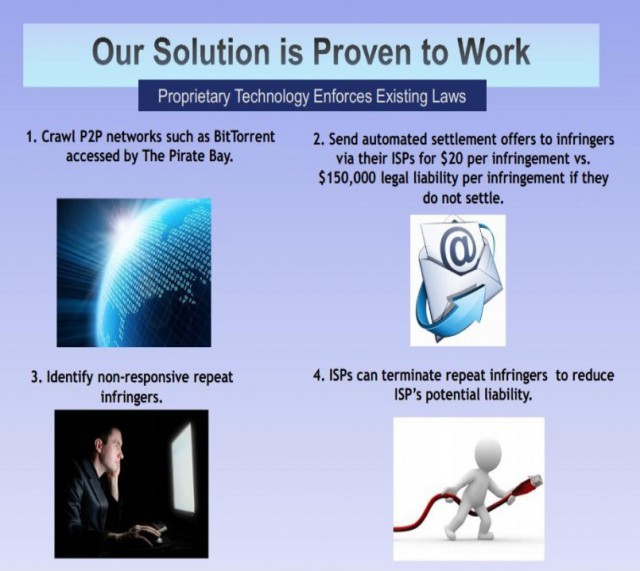
Steele told Ars Technica the days of Rightscorp having the power to instantly cut off your Internet access may not be too far off:
In the future, the company hopes to get more ISPs to comply—and it will expect more of those that are already cooperating, said Steele. Ultimately, Rightscorp is hoping for a scenario in which the repeat infringers it identifies aren’t just notified by e-mail. Instead, Steele hopes to see those users re-directed to a Rightscorp notice right at the moment they open their Web browsers.
“You wouldn’t be able to get around the re-direct page, and you’d have to pay a fine to return to browsing,” he explained. The company is in discussions with four ISPs about imposing such a re-direct page, according to Steele. But the details about which ISPs cooperate with Rightscorp, and how much they cooperate, is a secret that the company guards closely.
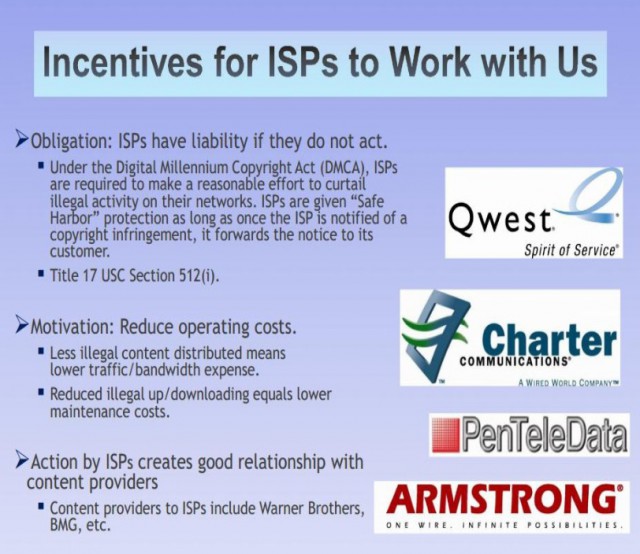
Their “partner” ISPs include defunct Qwest, which has been known as CenturyLink since 2011 and Charter Communications — the only major cable operator listed.
 Whether ISPs will grant unprecedented access to a third-party company trying to turn off their customers’ broadband while maintaining a financial interest in extracting settlements from those customers is doubtful.
Whether ISPs will grant unprecedented access to a third-party company trying to turn off their customers’ broadband while maintaining a financial interest in extracting settlements from those customers is doubtful.
Last week, Texas-based independent ISP Grande Communications informed the Austin-based U.S. District Court for the Western District of Texas that Rightscorp was engaged in shenanigans. In a strongly worded advisory to the court, Grande’s lawyers accused Rightscorp of using improper DMCA subpoenas to extract identifying information about alleged copyright offenders — a practice ruled improper more than a decade ago in RIAA v. Verizon, because no judge typically reviews the subpoena application. Rightscorp’s subpoenas rely entirely on the signature of an ordinary district court clerk in California:
Internet service provider and cable operator Grande Communications Networks LLC advises the Court that, one (1) business day after Grande filed its Motion to Quash Subpoena in this proceeding seeking to quash a subpoena served by Rightscorp, Inc. (the “Subpoena”), counsel for Rightscorp, Mr. Dennis J. Hawk withdrew the Subpoena.
The abrupt withdrawal of the Subpoena is consistent with the apparent desire of Rightscorp and its counsel to avoid judicial review of their serial misuse of the subpoena power of the federal courts. In addition, the withdrawal comes only after Grande was forced to expend considerable resources handling the Subpoena (and attempting to discuss it with Rightscorp’s counsel) and then preparing and filing the Motion to Quash.
As detailed in Grande’s Motion, the Subpoena presented an extraordinarily undue burden (over 30,000 subscriber lookups) and was issued to a cable operator without an order as required by the Cable Communications Act. Even more egregiously, it appears that the Subpoena is only one of approximately one hundred (100) or more similar subpoenas issued by Rightscorp to regional Internet service providers located across the country (presumably chosen because they are less likely to contest the subpoenas than national Internet service providers with larger in-house legal departments) upon the signature of the Clerk of the U.S. District Court for the Central District of California, seeking the personally identifiable information of thousands of individuals beyond the jurisdiction of the California courts, despite the fact that such subpoenas may not be sent and issued under 17 U.S.C. § 512(h) to an Internet service provider acting as a conduit under law that has been established for a decade.
Under the circumstances, this Court or the U.S. District Court for the Central District of California may consider ordering Rightscorp and its counsel to show cause why they should not be sanctioned for misusing the federal court’s subpoena powers. Such an order would be appropriate in connection with Grande’s request for costs and attorney’s fees in the Motion.
Beyond any doubt, Rightscorp and its counsel failed and refused to “take reasonable steps to avoid imposing undue burden or expense” on Grande. Fed. R. Civ. P. 45(d)(1). As Grande has explained, before the Motion was filed, Rightscorp’s counsel’s only response to Grande’s efforts to confer was a threat that “[w]e expect compliance by the service providers” and that Rightscorp “does not pay to obtain the address details on infringers.”
In addition, Rightscorp’s conduct also raises concerns under Rule 11, and, regardless, may present appropriate circumstances for the imposition of sanctions under the Court’s inherent powers.
The next business day after the Motion was filed, Rightscorp’s counsel made a hasty retreat. If Rightscorp believed it had a good faith basis for the Subpoena, it would have asserted its position before this Court.
But Rightscorp must know that its position and practice would not survive judicial review. If Grande had not challenged the Subpoena, Rightscorp would have improperly obtained the personally identifiable information of hundreds (or thousands) of Texas Internet subscribers using an invalid procedure, without the notice to any of them that would have followed from the court order that Rightscorp refused to seek to obtain, and without the slightest requirement of any showing to the California court whose signature Rightscorp improperly utilized. It appears clear that Rightscorp and its counsel are playing a game without regard for the rules, and they are playing that game in a manner calculated to avoid judicial review. Hopefully, they will not be permitted to continue much longer.
[flv]http://www.phillipdampier.com/video/CNBC Rightscorp Piracy 5-1-14.flv[/flv]
CNBC talked with Rightscorp CEO Christopher Sabec about copyright infringement, Net Neutrality, and whether or not copyright holders should simply cut the cost of their content as a disincentive to piracy. (5:28)

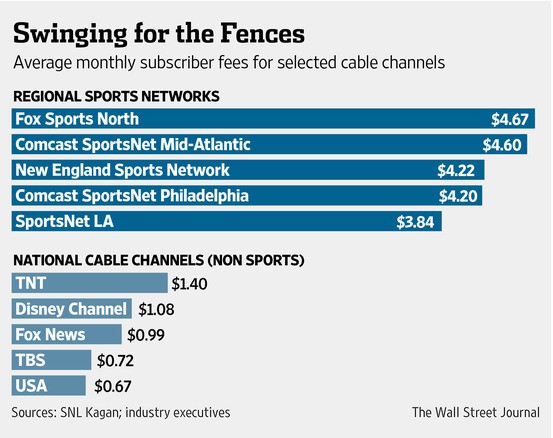
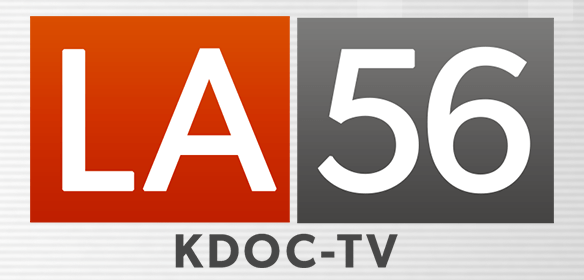 The embargo has cost both the Dodgers and Time Warner Cable plenty of advertising and subscription revenue. Ratings are dramatically down from an average of 228,000 viewers when the baseball games were shown on widely carried Prime Ticket, to just 55,000 today on SportsNet LA. Advertising rates have been slashed to compensate for the lack of an audience.
The embargo has cost both the Dodgers and Time Warner Cable plenty of advertising and subscription revenue. Ratings are dramatically down from an average of 228,000 viewers when the baseball games were shown on widely carried Prime Ticket, to just 55,000 today on SportsNet LA. Advertising rates have been slashed to compensate for the lack of an audience.

 Subscribe
Subscribe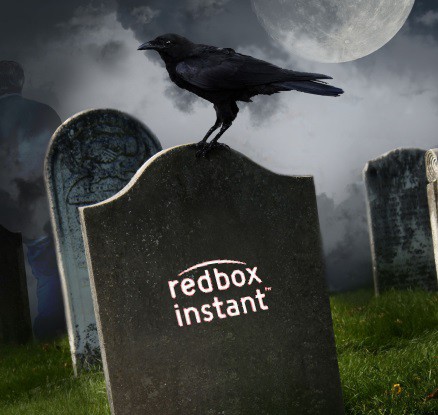


 The arrival of Netflix north of the American border has sparked a potential video revolution in Canada that some fear could renew “an erosion” of Canadian culture and self-identity as the streaming video service floods the country with American-made television and movies. But anxiety also prevails on the upper floors of some of Canada’s biggest telecom companies, worried their business models are about to be challenged like never before.
The arrival of Netflix north of the American border has sparked a potential video revolution in Canada that some fear could renew “an erosion” of Canadian culture and self-identity as the streaming video service floods the country with American-made television and movies. But anxiety also prevails on the upper floors of some of Canada’s biggest telecom companies, worried their business models are about to be challenged like never before.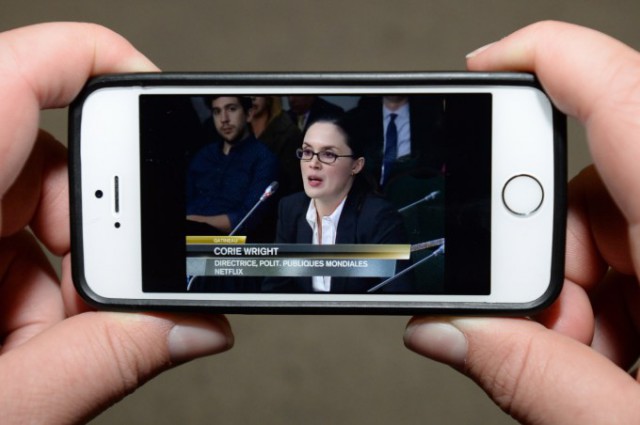

 Rightscorp does not appear to be spending its limited resources actually pursuing suspected violators in court. The threat of further action alone appears to have been enough for many to voluntarily pay the firm after receiving their first violation notice. Little, if anything, has happened to those who ignore Rightscorp’s settlement messages unless their ISP suspends access.
Rightscorp does not appear to be spending its limited resources actually pursuing suspected violators in court. The threat of further action alone appears to have been enough for many to voluntarily pay the firm after receiving their first violation notice. Little, if anything, has happened to those who ignore Rightscorp’s settlement messages unless their ISP suspends access.

 Whether ISPs will grant unprecedented access to a third-party company trying to turn off their customers’ broadband while maintaining a financial interest in extracting settlements from those customers is doubtful.
Whether ISPs will grant unprecedented access to a third-party company trying to turn off their customers’ broadband while maintaining a financial interest in extracting settlements from those customers is doubtful.


